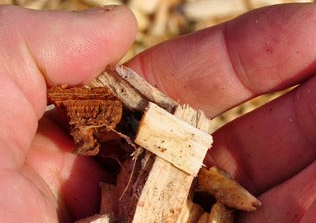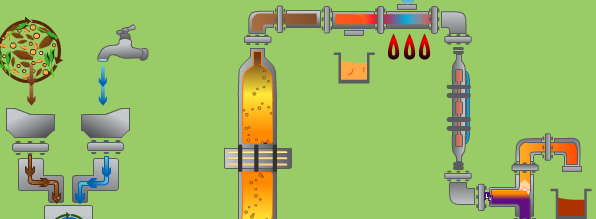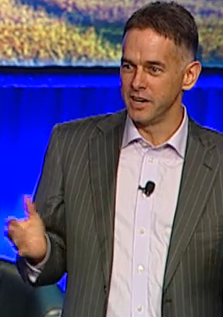
Renmatix, a small cellulosic sugar startup that says it can produce sugar from non-food biomass for the same price as making it from sugarcane, just received a $50 million investment from BASF, the largest chemical company in the world (press release). "Having demonstrated the process in a pilot plant, now, with BASF, we will be moving it to the industrial scale," said Mike Hamilton, CEO at Renmatix. That sounds audacious - even breathtaking - for a small company still in stealth mode last summer, which, after finally working out the kinks, made its core technology public last fall.
Having a large corporate partner also gives the company a potential customer - and bragging rights. That's a business model many clean energy startups envy as they attempt to scale up. The question is: can Renmatix succeed where other biofuel companies have failed?
Range Fuels: half-biomassed
BASF's vote of confidence follows the very public bankruptcy of Range Fuels, which, until its sudden demise, had represented high hopes for the DOE and the biofuel industry. After receiving over $150 million in venture capital and $84 million from taxpayers, Range Fuels' Georgia plant was recently sold off for pennies on the dollar. It had been designed to take wood chips from leftover pine tree harvesting and convert them into ethanol. But

the company's technology, which used gasification, never even managed to make ethanol. Producing some methanol in 2010, but operating at a loss, the facility was shut down in 2011.
The Range Fuels debacle was just part of the problem. The Bush era's wildly optimistic cellulosic fuel mandates have just been rolled back, the US government finally admitting that new fuel production has fallen far below expectations. The Wall Street Journal recently reported:
Last year the Environmental Protection Agency, which has the authority to revise the mandates, quietly reduced the 2011 requirement by 243.4 million gallons to a mere 6.6 million. Some critics suggest that even much of that 6.6 million isn't true cellulosic fuel.
Stubbornly high costs have remained the bane of biofuel makers, so much so that nearly all cellulosic ethanol is still made from corn or sugar cane. Methods tried by other companies, including using specialty enzymes and heat-driven chemical processes, have drawbacks: enzymes are too expensive; acids are toxic. Both processes are slow, and they require expensive equipment.
Getting critical - supercritical
According to tech website GIgom, Renmatix has a unique method for converting non-food biomass (see animated graphic here, use cursor to animate), such as wood chips, municipal waste, or grasses into sugar. In a process the company calls "supercritical hydrolysis," it uses water at high temperatures and pressure as a solvent to break down biomass rapidly into usable sugars. Renmatix says that while that process has been used in other industries like pharmaceuticals and coffee production, they are the first to implement the process for biofuels and biochemicals.

The patented process involves putting hardwoods into a small pressurized chamber. Then one class of sugars, the type with five carbon atoms, is removed and harvested. Leftover material is pumped into a second pressurized vessel to release the remaining sugars. In both phases, the cellulosic material is treated by water at a pressure and temperature that is so high that the water is neither steam nor an ordinary liquid but in a supercritical form.
The process is very rapid -- taking only seconds and minutes -- compared to competitor's processes that can take days. Because of the high speed of the reaction, a relatively small amount of equipment can produce a lot of sugar, keeping costs down. "In the twentieth century, oil was the basis for making chemicals and fuels. In this century, sugar is replacing oil as raw material," said Hamilton.

At Renmatix's demo facility in Kennesaw, Georgia, the company has already scaled its process to convert three dry tons of woody biomass to sugars daily. Its goal is to create multiple, regional plants that can process 100,000 tons per year of non-food biomass. In September, to further support the company's growth plans, Renmatix started technical and business operations in King of Prussia, Pennsylvania. (see press video)
Sugar: king of all biomass
CEO Mike Hamilton, according to Website CW Renewables, feels that the low cost and simplicity of Renmatix's process has made it a potential front-runner in the cellulosics market.

Hamilton explains the appeal of his company's end-product, sugar:
"I think a lot of people fell in love with the biology of enzymes, but hardcore chemists like BASF recognized the importance of chemistry in solubilizing sugars. Our process is very elegant. There's simplicity to it, and we learned how to drive the process efficiently." Hamilton also said the funds will be used to build its first industrial-scale plant, which should be announced in the first half of 2012.
Gigom compared Renmatix to Codexis, which has already IPO'd and is now a public company with major backing from oil giant Shell. Codexis is also targeting the low-cost sugar market, and sells its sugar-making enzymes to biofuel producers. Renmatix and Codexis share more than the same market. Like Hamilton, Codexis's CEO Alan Shaw also feels that cheap sugar is the new oil.
Is Renmatix on the right path?
Photo: Renmatix plant workers, biomass, graphics, and CEO Hamilton from Renmatix website




Comments
Hardwoods? Thats the future of energy? I dont think so.
Hardwoods? I don't think so either (neither does Restoration Hardware), but, if they ever work out the kinks, cellulosic inputs will play a part. Especially in the chemicals world.